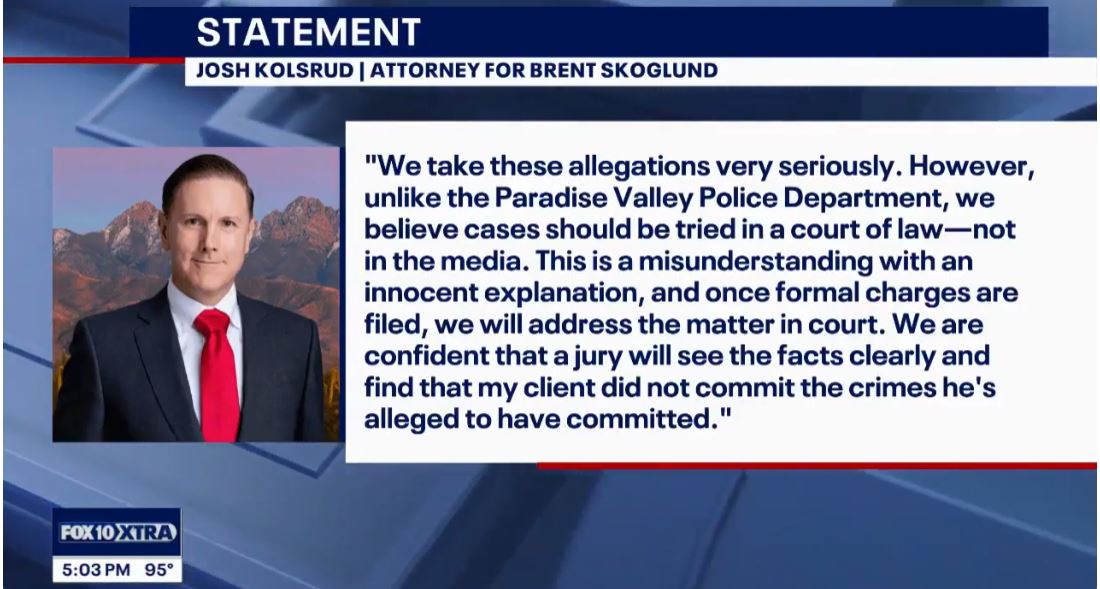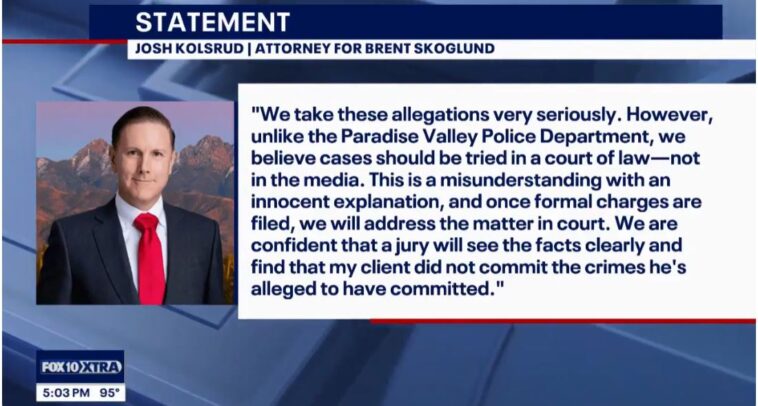
Paradise Valley Embezzlement Case: A Close Look at Fair Trial and Local Government Accountability
In recent weeks, the small yet affluent municipality of Paradise Valley has found itself at the center of a legal storm. Allegations against former Public Works Superintendent Brent Skogland for misusing public funds have stirred up controversy in this tight-knit community. The charges, which include theft and the misuse of taxpayer monies, have sparked heated debates about fairness in the legal process, the role of media in shaping public opinion, and the significance of clear financial oversight in local governments.
At the heart of the matter is the vigorous defense led by criminal attorney Josh Kolsrud, who insists that every individual deserves a fair chance to explain the seemingly questionable transactions that have now drawn official scrutiny. This editorial seeks to take a closer look at the tangled issues of local government mismanagement, the media’s role in high-profile cases, and how intricate local regulations affect communities—exploring the fine points of legal rights, the critical protection of taxpayer funds, and the importance of due process.
Understanding the Case: Allegations and the Legal Process
The allegations against Brent Skogland center on a series of purchases recorded on Paradise Valley’s credit accounts between 2021 and 2023. Items such as a motorcycle battery, repairs on a pool motor, and a North Face jacket for his wife have all been flagged as potential misuses of public funds. According to local reports, these purchases, cumulatively amounting to just over $10,000, raised significant alarms for the incoming public works director, Jerry Cooper, during a regular budget review.
This case touches on several tricky parts of local governance. Although the amount in question may seem modest when viewed in isolation, in a small-town environment with a limited budget, even seemingly minor misallocations can lead to deferred maintenance projects and strained public resources. The local police have recommended formal charges after seizing more than 100 items from Skogland’s property, an action that has thrust this issue into the spotlight of community and legal debate.
Fair Trial in an Era of Instant Media Trials
One of the key assertions made by Josh Kolsrud in his response to allegations is his strong belief in the courtroom as the proper arena for resolving disputes. Kolsrud has repeatedly emphasized that legal matters should be decided by judicial processes, not by snap judgments made in the glare of media headlines.
In a time when the media is quick to label individuals based solely on preliminary reports, there is a growing concern about the potential for a “trial by news broadcast.” Such media-driven verdicts have the power to skew public opinion before any evidence is meticulously examined in court. Kolsrud’s call for due process underlines the need to steer through the confusing bits of media speculation and focus on thorough judicial evaluation.
Local Government Oversight: Essential Measures to Protect Taxpayer Funds
This case also forces us to confront important questions about accountability at the local government level. With every dollar allocated from municipal budgets directly impacting essential services—such as road repairs, park maintenance, and other community needs—transparency in public spending is super important. In a small community like Paradise Valley, trust in local government is paramount, and any misuse of funds, however modest, can have far-reaching implications.
To clearly understand the situation, consider the following basic elements:
- Budget Impact: Misuse of funds can delay necessary infrastructure projects.
- Community Trust: Proper management is key to retaining voter confidence.
- Legal Precedents: Previous cases in similar jurisdictions highlight that even small-scale embezzlement can have big consequences.
With taxpayers expecting their contributions to be managed responsibly, the case serves as a reminder of the subtle parts involved in financial oversight and public accountability. Failure to manage these funds correctly not only diminishes public resources but can also erode community trust over time.
Legal Responsibility and the Defense’s Position: A Closer Look
Josh Kolsrud’s defense strategy focuses on two main points: the assertion that his client’s actions were based on what he argues to be legitimate, if poorly documented, exigencies, and the assertion that any pretrial media trials are neither fair nor justified. The attorney has been clear: his client deserves to be given the opportunity to explain the circumstances in detail within the scrupulous environment of a courtroom.
By taking a stance that emphasizes accountability and a systematic legal process, Kolsrud aligns himself with the view that judicial systems must carefully sort out the evidence before any public pronouncements are made. This perspective calls for a reminder that, as tangled as legal matters can be, the responsibility to ensure fairness rests with the judiciary.
Media Sensationalism and Its Impact on Legal Fairness
One of the most nerve-racking facets of modern legal controversies is the inherent tension between media narratives and the slow, deliberate pace of the judicial process. In the Paradise Valley case, the media’s immediate portrayal of Skogland as a wrongdoer has created an atmosphere in which public opinion might be unduly influenced before all the facts are on the table.
Media sensationalism can lead to several problematic outcomes:
- Pretrial Bias: The public might form biases that could affect potential jury pools and the overall fairness of the trial.
- Pressure on Judicial Actors: Judges and prosecutors might feel an undue pressure to expedite processes in order to reciprocate public sentiment.
- Misunderstanding of Complex Issues: The tricky parts of financial oversights and local governance may be oversimplified.
It is thus imperative for legal professionals, including attorneys like Josh Kolsrud, to challenge this trend. By insisting on a formal judiciary process, one that involves careful assessment of each piece of evidence, the defense reaffirms the principle that justice must be served in a methodical and unbiased manner.
Analyzing the Hidden Complexities of Financial Mismanagement in Small Jurisdictions
While the Paradise Valley incident may appear straightforward at first glance, a closer look reveals a labyrinth of tangled issues typical of local government financial oversight. Small jurisdictions often operate with constrained budgets, which means the misallocation of even a small sum of money can have magnified consequences. The following table outlines the fine points of what is at stake in cases like this:
| Aspect | Details |
|---|---|
| Budget Limitations | Small communities operate within strict budgetary parameters; even minor misuses can force delays in essential services. |
| Public Trust | Residents expect transparency and accountability from elected officials; any deviation can lead to lasting distrust. |
| Legal Implications | Even if the total amount is modest, legal frameworks do not always make allowances for scale in embezzlement cases. |
| Community Impact | Misused funds can impact critical projects like road maintenance and public safety enhancements. |
These subtle parts of local government finance remind us that public funds are not simply numbers on a ledger—they represent the lifeblood of community infrastructure, services, and overall quality of life. In this light, the case serves as a cautionary tale for all public servants charged with managing communal funds.
Community Trust and the Essential Role of Transparency
A key element of the ongoing debate in this case is the question of transparency. For communities like Paradise Valley, local government transparency is more than a matter of good practice—it is super important for maintaining public confidence. When governmental officials are perceived as using taxpayer dollars irresponsibly, the damage goes far beyond the immediate financial ramifications.
Transparency, in this context, involves several important steps:
- Open Budget Reviews: Regular and detailed budget reviews allow community members to see where their money is going.
- Clear Documentation: Meticulous record-keeping and proper documentation help prevent misunderstandings and misinterpretations of financial actions.
- Public Accountability: Holding officials accountable for fiscal decisions is necessary to maintain a healthy relationship between the government and its constituents.
In Paradise Valley, the recent incident has served as a catalyst for discussions aimed at bolstering the community’s financial oversight mechanisms. While legal processes play a critical role in resolving the specific allegations, the broader conversation includes efforts to safeguard transparent practices that ensure every public expenditure is justified and clearly documented.
Fairness in the Courtroom Versus the Court of Public Opinion
Josh Kolsrud’s repeated call for a fair trial is not just a reflection of his commitment to his client; it is a stand against the modern trend of forming judgments based on media narratives. There is a fundamental difference between public opinion shaped by rapid news cycles and the judicial process, which is designed to manage its way through carefully vetted evidence and witness testimonies.
This distinction underscores a crucial aspect of our justice system:
- The Right to a Fair Hearing: Every accused individual is entitled to a measured and impartial hearing where all evidence is considered.
- The Role of Formal Procedures: The legal process involves multiple stages—arraignment, discovery, pretrial motions, and eventually, trial—each offering opportunities for detailed scrutiny.
- Protection from Hasty Judgments: Insisting on following the proper legal channels protects individuals from the often overwhelming force of media pressure.
The insistence on due process by the defense is not merely a legal tactic; it is a reminder to society that the wheels of justice turn slowly for a reason. Allowing the courtroom to function as the ultimate judge, rather than succumbing to public outcry, is essential in preventing miscarriages of justice that can ensue when external opinions take precedence over established legal procedures.
The Impact of Pretrial Publicity on the Judicial Process
One cannot ignore the potential dangers posed by pretrial publicity in high-profile cases such as this. As media channels broadcast preliminary findings and create buzz around the allegations, they introduce an overwhelming and often intimidating set of circumstances that have the power to influence various stages of the judicial process.
Some of the subtle details to consider include:
- Jury Selection Pressures: Potential jurors may be exposed to media portrayals that could bias their opinions before stepping into the courtroom.
- Pressure on Legal Practitioners: Both defense and prosecutorial teams may face undue external pressure, making it challenging to focus on the fine points of evidence.
- Public Perception: An overzealous media environment can sometimes create a narrative that oversimplifies the case’s true and complicated pieces.
The legal community continues to debate the best ways to manage these challenges. Some suggestions involve implementing stricter controls on media coverage during sensitive pretrial phases, while others advocate for judicial instructions to potential jurors that emphasize the importance of impartiality. What remains clear is that preserving the integrity of the judicial process requires that both legal professionals and the media work together to ensure that public opinion does not override the measured deliberations that a court of law demands.
Comparing Small Jurisdictions and Their Challenges in Embezzlement Cases
Embezzlement cases in small towns carry a unique set of challenges that differ markedly from those in larger jurisdictions. In a smaller community, even a seemingly minor financial misstep can have disproportionally drastic effects. Beyond the immediate legal implications for the individual involved, there is a broader, community-wide ripple effect that touches on public perception, government operations, and community morale.
Consider the following points that highlight how small jurisdictions grapple with similar issues:
- Budgetary Constraints: With limited funds available, every financial decision is super important. When funds are diverted, essential public projects can suffer.
- Limited Oversight Resources: Small jurisdictions might not have extensive internal audit or oversight departments, making it challenging to immediately identify and address every financial misstep.
- Tighter Community Scrutiny: In a close-knit community, every action by public officials is heavily scrutinized by neighbors, friends, and family, which can escalate the intensity of public debate.
In Paradise Valley, these fine points are particularly evident. The relatively modest amount in question only underscores how every dollar is precious in a limited budget. As the community watches the legal process unfold, they are also forced to confront the broader issues of trust and accountability that are essential to maintaining smooth local governance.
Key Takeaways and the Road Ahead
As the legal proceedings against Brent Skogland advance, several key takeaways emerge for communities, public officials, and legal practitioners alike:
- Due Process is Paramount: Regardless of public opinion or media speculation, every individual deserves a fair trial where evidence is thoroughly examined.
- Local Oversight Must Be Strengthened: Cases like this serve as a reminder of the nerve-racking need to enhance fiscal transparency and accountability in local governments.
- Impact Beyond Financial Loss: The effects of misused public funds extend far beyond the immediate financial deficit; they can erode community trust and delay critical services.
- Media’s Role Should Be Cautious: While the media plays an essential role in informing the public, sensationalism should not come at the cost of tarnishing the credibility of the judicial process.
Looking ahead, the community in Paradise Valley—and indeed in similar small jurisdictions—must focus on working through the tangled issues of public spending and accountability. With the county attorney expected to file formal charges after careful review of the evidence, the next several weeks promise to be filled with judicial motions, detailed investigations, and perhaps even opportunities for policy reforms designed to prevent a recurrence of such incidents.
Striking the Balance: Protecting Individual Rights and Public Interests
One of the trickiest parts of this entire debate is achieving a balance between individual rights and public interests. On one hand, every citizen, including public officials, is entitled to a complete and unbiased legal review where accusations are weighed cautiously. On the other, public funds, when mismanaged, can impact the entire community, necessitating robust oversight and accountability measures.
To create this balance, it is essential that civic leaders, auditors, and legal professionals work in tandem. Consider the following approaches:
- Enhanced Audit Mechanisms: Implementing more regular and detailed audits can help in early detection of financial mismanagement.
- Clear Documentation Policies: Establishing stringent documentation practices for all public expenditures can reduce the risk of misinterpretation.
- Educational Initiatives: Training programs for public officials about the importance of fiscal responsibility can prevent future missteps.
- Community Involvement: Engaging community members in budget review sessions and public forums can foster transparency and build trust.
These steps not only protect public resources but also reinforce the trust that is essential for a thriving local government. By taking proactive measures, communities can ensure that all public funds are used judiciously and that any errors are addressed before they snowball into larger legal battles.
Dissecting the Defense’s Strategy: Innocent Explanations Amid Serious Allegations
Defense attorney Josh Kolsrud’s strategy has centered on two major arguments: first, that all the expenditures attributed to his client have innocent explanations, and second, that the full scope of the circumstances has been misunderstood in the rush to jump to conclusions. Kolsrud contends that many of the purchases, although suspicious at first glance, had a legitimate basis that has simply been obscured by poor record keeping and misinterpretation.
This approach raises several interesting points:
- Opportunity for Contextual Analysis: It is important to investigate whether the transactions in question were part of routine operations that lacked proper documentation rather than deliberate attempts to misuse public funds.
- The Role of Due Diligence: The defense encourages taking a closer look at internal controls and the decision-making processes involved in authorizing these purchases.
- The Risks of Rushing to Judgment: By insisting that the case be decided in a courtroom, the defense underscores the dangers of making hasty conclusions based on incomplete information.
In a broader sense, this strategy reflects important lessons for any legal encounter. Rather than succumbing to the immediate impact of sensational charges, it is critical to work through the evidence and give due weight to each piece of documentation. As the case continues, observers will be watching closely to see whether these innocent explanations can stand up against the claims made by the prosecutors and whether the fine details of the financial records ultimately support one narrative over the other.
Impact on Future Legal and Fiscal Policies in Small Communities
Beyond the immediate legal contest, the Paradise Valley embezzlement case has the potential to shape future policies in small communities across the country. When local financial mismanagement gains public attention, it often accelerates reforms designed to plug gaps in oversight. Several proactive measures could emerge as a direct response to the phenomena observed in this case:
- Stricter Financial Controls: Communities may invest in advanced monitoring systems to track expenditures with greater precision.
- Enhanced Training for Public Officials: Educational programs focused on responsible fiscal management and the proper maintenance of financial records could become standard practice.
- Regular External Audits: Mandatory third-party audits could be introduced to reinforce transparency and accountability in local government spending.
- Public Involvement Initiatives: Increased transparency measures such as public budget hearings and online portals for tracking expenditures may gain traction.
These proposals reflect a broader movement towards ensuring that every penny of taxpayer money is accounted for. By learning from the mistakes highlighted in the case, communities can take measures that not only prevent future misuses but also restore public confidence in the institutions that serve them.
Looking Beyond the Headlines: The Long-Term Implications for Public Governance
One of the most interesting, albeit often overlooked, aspects of cases like this is their long-term impact on public governance. While the present focus is on the immediate legal ramifications, the long-term consequences for political accountability and government transparency can be profound. The case underscores the need for communities to continually assess and update their internal procedures, ensuring that all public expenditures are justified and meticulously documented.
The following points highlight the lasting lessons that can be learned:
- Institutional Reforms: Government bodies might institute new policies designed to prevent similar issues, thereby protecting future budgets from similar pitfalls.
- Enhanced Public Participation: Encouraging community members to be more active in budget discussions can lead to a more engaged and informed electorate.
- Rigorous Legal Standards: Ensuring that both prosecutors and defense attorneys abide by strict evidentiary standards will help maintain the balance between rapid public accountability and the careful administration of justice.
- Political Accountability: Cases like this serve as reminders to all public officials that irresponsible actions can have significant and lasting consequences, both legally and politically.
As we get into the coming months, the eyes of both the legal community and the public will be on Paradise Valley, watching to see whether these long-held principles of justice are upheld in the court of law. Ultimately, the real verdict will come from a careful weighing of evidence, not from the buzz created by headlines or social media.
Final Thoughts: Trust, Transparency, and the Pursuit of Justice
The Paradise Valley embezzlement case is a microcosm of a broader challenge that many small communities face today: the need to reconcile trust in public officials with the demands of transparency and accountability. The delicate balance between these factors is at the core of the controversy surrounding Brent Skogland’s alleged actions. While attorney Josh Kolsrud’s insistence on resolving the matter in a courtroom is commendable, it also raises important questions about how our society handles high-profile cases in an age of instant information and media saturation.
It is super important to remember that when discussions about financial oversight, legal rights, and community trust arise, every stakeholder—from public officials to ordinary taxpayers—has a role to play. Ensuring that due process is respected, that clear and accurate records are maintained, and that the media reports responsibly are all essential steps in preserving the integrity of our legal and political systems.
As we move forward, the lessons of this case should prompt not only legal and governmental reforms but also a renewed commitment from all of us to hold public institutions accountable. Only by taking the time to figure a path through the confusing bits of media speculation, financial documentation, and legal argumentation can communities reaffirm their faith in justice and transparent governance.
Building a Future of Accountability and Informed Public Discourse
This case serves as a crucial learning point for the future of small-town governance across the nation. The issues that have emerged in Paradise Valley highlight the need for all communities to adopt robust measures for fiscal accountability while ensuring that every accused individual receives the full benefit of a fair judicial process.
Looking at the situation from a broader perspective, several strategies can help build a solid foundation for future accountability:
- Routine Financial Reviews: Establishing regular reviews and audits for all public funds can serve as an early warning system for potential issues.
- Transparent Communication Channels: Creating official channels where local governments can share budgetary updates with the public can help bridge the gap between officials and residents.
- Judicial Integrity: Courts must remain insulated from external pressures to ensure that justice is administered based solely on the evidence and legal argumentation.
- Civic Education: Empowering citizens with the knowledge of how local government finances are managed can drive higher expectations for accountability and care in public spending.
Each of these steps reinforces the idea that while the details might sometimes appear as complicated pieces, the overarching goal of justice and transparent governance is within reach if all stakeholders commit to working together.
Conclusion: The Road to a Balanced and Fair Resolution
In conclusion, the Paradise Valley embezzlement case stands as a stark reminder of the challenging realities associated with managing public funds in a small community. The fine details of this case present not only legal questions but also broader issues of community trust and public accountability. Attorney Josh Kolsrud’s insistence that the case be decided in a courtroom—a space designed for methodical and impartial judgment—underscores the nerve-racking need to keep individual rights intact while protecting public funds.
Moving forward, the community of Paradise Valley and similar jurisdictions must work together to ensure that accountability mechanisms are strengthened and that every piece of public expenditure is transparent and justified. It is through such collaborative efforts that we can hope to foster a culture of integrity, where public officials are held responsible, and where a fair judicial process remains the cornerstone of our legal system.
As citizens and legal practitioners, it is our shared responsibility to remain vigilant and proactive. Let this case remind us that protecting public resources is super important, and that ensuring every stakeholder—from government officials to ordinary taxpayers—plays a part in upholding these standards is a must-have condition for a well-functioning, fair society.
Ultimately, the verdict in this matter will not only clarify the fate of one individual but also cast a long shadow over how small communities manage their financial affairs in the future. In the end, the court of law—free from media sensationalism and rushed judgments—will decide whether justice has been truly served, paving the way for reforms that can help prevent similar issues from arising again.
In a world where the twists and turns of legal proceedings often seem overwhelming, it is essential that we all commit to the fundamental principle of fairness. By doing so, we can ensure that justice is secured, public resources are protected, and the trust of our communities is maintained for generations to come.
Read more about this topic at https://kolsrudlawoffices.com/attorney-josh-kolsrud-demands-fair-trial-for-bren-skogland/
Related articles you might like
due process | Wex | US Law | LII / Legal Information Institute
Procedural Due Process Civil :: Fourteenth Amendment


